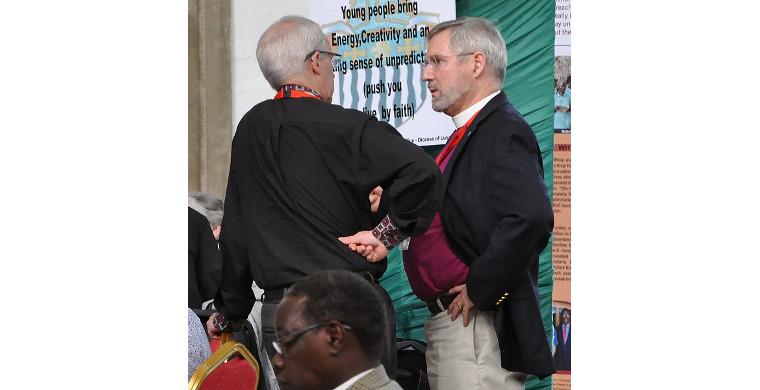LUSAKA: SURPRISE! Anglican Consultative Council declines to go along with 'consequences' for TEC
By David W. Virtue DD
www.virtueonline.org
April 19, 2016
The Anglican Consultative Council, to no one's surprise, declined to endorse or take any action to the primates' call in January for three years of "consequences" for the Episcopal Church.
This should make things a lot easier for the GAFCON primates when they meet next week in Nairobi.
The primates' call was in response to the 78th General Convention's decision to change canonical language that defines marriage as being between a man and a woman (Resolution A036), and authorize two new marriage rites with language allowing them to be used by same-sex or opposite-sex couples (Resolution A054).
The primates had said that they were "requiring" that for those three years, the Episcopal Church not serve on ecumenical and interfaith bodies, not be appointed or elected to an internal standing committee, and "that while participating in the internal bodies of the Anglican Communion, they will not take part in decision-making on any issues pertaining to doctrine or polity."
The ACC passed a resolution (dubbed C34) that received the Archbishop of Canterbury's formal report to it on the primates' gathering, and affirmed the primates' commitment to walk together. The resolution also committed the council "to continue to seek appropriate ways for the provinces of the Anglican Communion to walk together with each other and with the primates and other Instruments of Communion."
The resolution was passed early in the session, with no debate, because it was placed on the consent calendar, a new approach for the ACC that allowed for a single up-or-down vote on all of the included resolutions. Another resolution, labeled C35, began the day on the consent calendar and, as the afternoon session began, was withdrawn from consideration. It was a one-sentence statement by which the ACC would have said it "welcomes" the primates' communique, according to an ENS report.
Archbishop of Canterbury Justin Welby told the ACC that he would be "very glad" if C35 was withdrawn because C34 "covers the issues we need to cover."
Welby went on to say that when he had met the previous day in Harare with Zimbabwe President Robert Mugabe, the notorious African leader had asked him about the communion's stance on same-sex marriage. The archbishop said he told Mugabe that while Anglicans have "widely differing views ... the majority opinion is that marriage is a lifelong union between a man and woman.
"And that the unanimous opinion of the primates' meeting was that the criminalization of LGBTIQ people is entirely wrong."
"I don't think it would be fair to say that he entirely agreed with me," Welby added.
In the future, Welby said, "When I talk to people I am going to be honest. Let's never pretend that things are other than they are. We are not entirely united on the issues around human sexuality. We have profound and important divisions among us. It's clear what has been the majority opinion among us. It's also very clear that, when it comes to criminalization, that we are deeply committed to combatting that in every place where we find it and not supporting those who support it."
Unlike recent ACC meetings when members began considering resolutions early in the gathering, ACC-16 saw 45 resolutions all presented on the last full day of the April 8-19 meeting at the Cathedral of the Holy Cross in Lusaka.
On April 15, the ACC delegates elected Hong Kong Archbishop and Primate, Paul Kwong, as the council's next chair. On April 18, the members also elected Church of England lay member, Margaret Swinson, as vice chair and five representatives to the communion's Standing Committee.
The clarity and indecisiveness of Welby only further indicates that he cannot square the circle on marriage, and so he should not be surprised that when the GAFCON primates meet, they will tell him in no uncertain terms that he no longer represents them.
It is well known that children of alcoholic parents, as Welby is, are often conflict-averse. If such a person rises to leadership in a denomination or corporation, he is at risk for a people-pleasing style of leadership. During periods of organizational stability, such leaders do not injure the institution. However, when there is upheaval in matters of doctrine or crisis due to economic change, people-pleasing leaders represent a disaster for institutional survival. In churches, such leaders issue platitudinous, banal encyclicals, while tithing collapses in the face of inevitable ruptures into splinter groups.
Welby now finds himself in the grip of such a situation. His failure to stand up to the ACC and to declare a biblical position with Mugabe, and to say what the Primates did in January cannot be overturned, reveals a level of spiritual cowardice which will come back to bite him.
END














